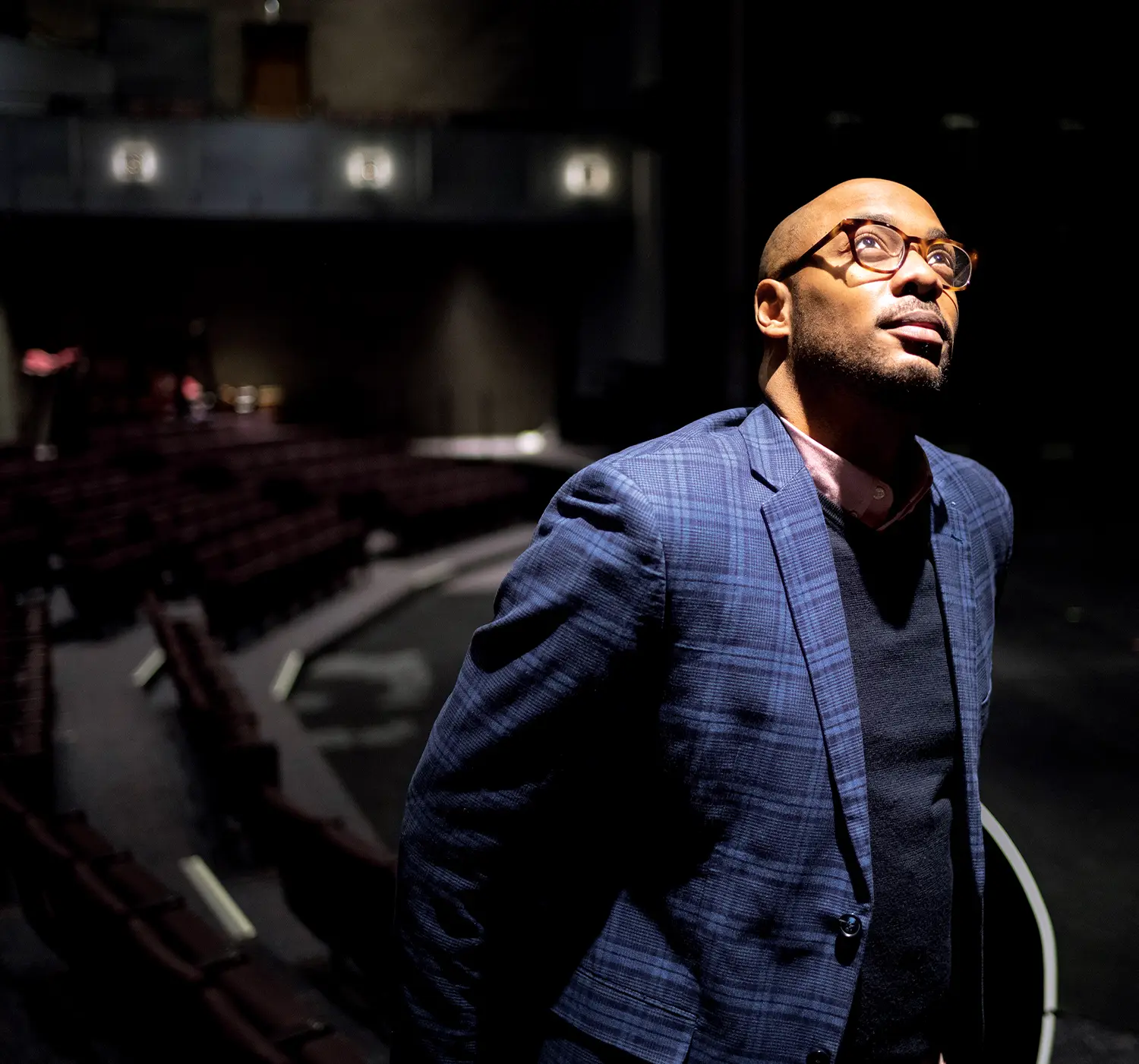Time Travel and the Magic of the Shared Experience

laurence kesterson
“When students are talking in the back of the room, or they’re not listening, I have to let them know that I’m a live, performing body,” says Wooden, an assistant professor of theater who joined Swarthmore in 2022. They need to know that “their reactions are shaping my performance and they are transforming what’s happening in front of them.”
It’s “the magic of the shared experience,” he says, and it’s what makes theater distinct from mediums like film. Theater can enable transformative encounters.
“You are gathering people together, and for a moment, you are trying to create possibilities for folks to experience another kind of life,” he says. “A different set of possibilities.”
It’s a power that has long amazed him about the stage. Growing up as an all-singing, all-acting kid in Baltimore, in high school Wooden was sure he would become an actor.
“I loved working in close community with others,” he says, “to make new worlds.”
As an undergraduate at Georgetown University, though, politics or law seemed to offer more reliable career options. Nevertheless, he agreed to work on a student production of August Wilson’s The Piano Lesson. He was working behind the scenes, designing the set.
But it was enough to revive his passion.
A few years after graduation, Wooden, who was by then working as a higher education administrator, received a phone call. Would he return to Georgetown to be the artistic director of the university’s Black Theater Ensemble? He accepted the offer.
“I tried to move away from the theater,” he says, “but it kept calling me back.”
Knowing he wanted to find a way to combine performance with his scholarship, Wooden completed his Ph.D. at Stanford University under Harry J. Elam Jr., a renowned scholar of African American theater and performance who is also a professional director.
“He understood the value of being inside the rehearsal room, even as he was producing scholarship that was at the top of the field,” says Wooden.
Like his advisor, Wooden has built a career that blends performance with award-winning scholarship. Last year, the American Society for Theatre Research awarded him the Errol Hill Award for Outstanding Scholarship in African American Theatre and Performance Studies. And 2025 will see the publication of two books: a co-edited volume on the work of August Wilson, whose The Piano Lesson helped convince Wooden to return to the theater; and a monograph titled Reclaiming Time: Race, Temporality, and Black Expressive Culture, about the way Black theater and media arts offer unique experiences of time.
It’s a book about what has been, for Wooden, a long-standing obsession. “I often ask my students: ‘How many of you have ever time traveled?’” he says. “Nobody puts their hand up. But then I say: ‘Well, how many of you have been to the theater?’ Because, if you’ve been to the theater, you’ve time traveled.”
As an audience member, Wooden explains to his students, you are exploring multiple temporalities at once. There’s the time of your body, which is attuned to things like sleep or hunger. And then there’s the time of the play, which might move between years or decades.
“The audience is shifting between body time, the changing times within the performance, and the time of the show, time traveling in such an interesting way,” he says.
All this time traveling means Wooden ends up thinking a lot about the finite nature of life.
In 2023, he directed a student production of Everybody, a contemporary play by Branden Jacobs-Jenkins. The work is a modern take on Everyman, a morality play from the 15th century. Death is personified as a character. “But it’s all about what it means to make a meaningful life,” says Wooden.
Putting on the play led to profound conversations with his students. “Thinking through the character of death in the play, we ended up exploring how they understood what it means to fashion a life with meaning and impact,” he says.
A lot of students, adds Wooden, are approaching this question at the macro level: They want to have a career they are passionate about.
“But I was interested in talking about the day-to-day interactions that allow for forms of meaning-making that they’d like to pursue,” he says.
Because those small interactions, bit by bit, can end up forming new worlds. And therein lies the magic of theater.